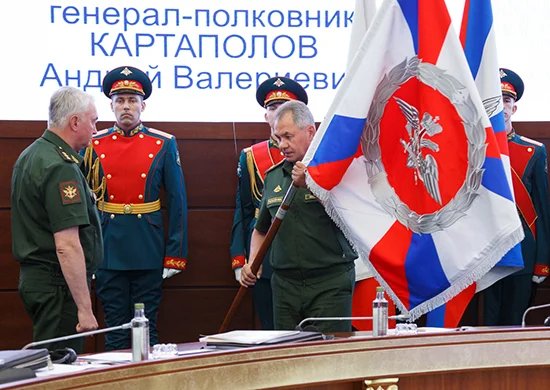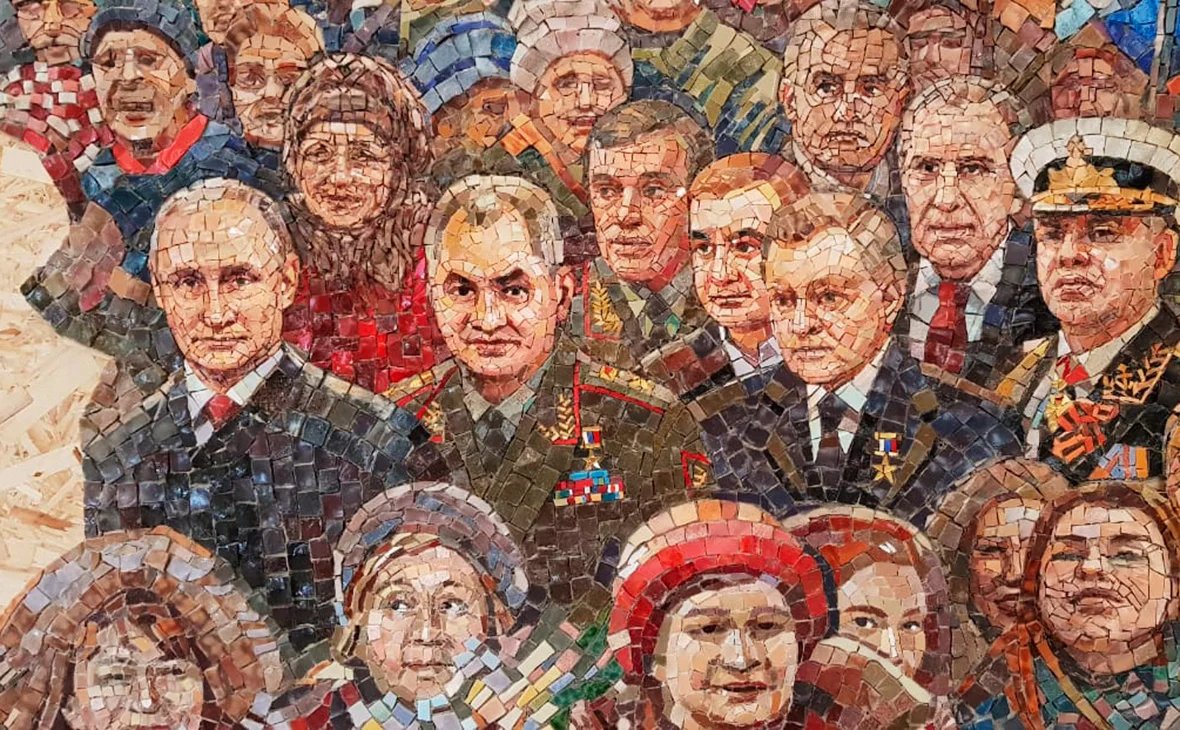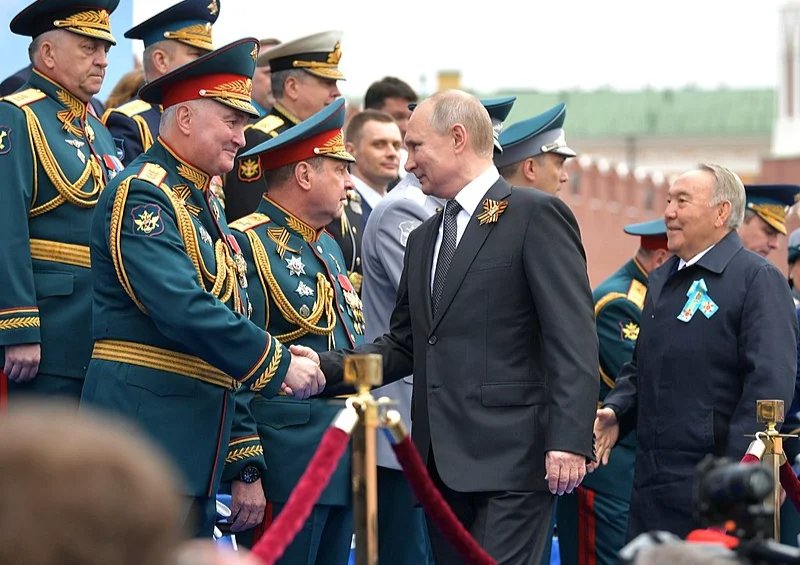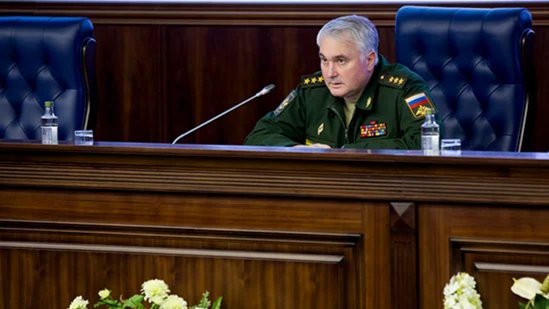Andrey Kartapolov is a retired Russian colonel-general, former deputy defence minister in charge of patriotic youth education, curator of the Young Army movement and the Main Church of the Russian Armed Forces (known for its murals with Stalin and Putin). He is the head of the Russian parliament’s defence committee and the author of the much-publicised digital draft notice law which in effect introduces serfdom for the country’s male population.
In his appearance on Russian state TV, during the political talk show 60 Minutes, Kartapolov advised the Russians who had left the country to return and “pay their debt to the motherland” and called those opposing the law “pro-Yankee scum”.
Novaya Gazeta Europe investigates how Kartapolov tends to pay his own debt to the motherland and what he generally means by that notion.
…
Andrey Kartapolov was born in November 1963 in Weimar, East Germany, where his father, Colonel Valery Kartapolov, was serving at the time. The mother of the future colonel-general was a teacher.
Kartapolov Jr. followed in his father’s footsteps and received a military education. He began his military service in the Group of Soviet Forces in Germany (renamed Western Group of Forces in 1989 and existing till 1994). Later, Kartapolov transferred to the Far Eastern Military District. He served first as platoon commander, rising through the ranks to become commander of the 18th Machine Gun and Artillery Division (on the Far Eastern island of Sakhalin) — the only such division in Russia, as Kartapolov’s official biography notes.
In the 2000s, Kartapolov’s military career advanced rapidly: he held important positions in the Siberian, Moscow, North Caucasus, Southern, and Western Military Districts and was finally appointed deputy chief of the General Staff of the Russian Armed Forces.
Until the summer of 2014, however, Andrey Kartapalov was not a widely known persona. No one quoted him, and he himself was notably less verbose in public.
Kartapolov and MH17: the first lie
When the Malaysia Airlines Boeing 777 was shot down over Donbas in July 2014, resulting in 298 deaths, Andrey Kartapolov, who was then deputy chief of the Armed Forces’ General Staff, got his first relatively wide publicity. Just four days after the crash, something — or someone — forced him to speak out on the subject.
At a Russian Defence Ministry press conference on 21 July 2014, Kartapolov categorically claimed that the Boeing had been shot down by Ukrainian forces.
He alleged that Russian radar surveillance equipment had picked up a Ukrainian Armed Forces Su-25 jet flying at a distance of 3-5 km from a civilian aircraft shortly before the crash. Kartapolov stressed that the Su-25 is capable of briefly reaching an altitude of 10,000 metres. For a long time, the idea that a Ukrainian plane was involved in the incident was the main version peddled by Russian pro-government media.
However, an international investigation showed that the data presented by Kartapolov was deliberately fabricated and no Ukrainian military aircraft was recorded in the vicinity of the Boeing on the day of the crash. Two years after the disaster, the Russian Ministry of Defence was forced to abandon Kartapolov’s version.
However, Kartapolov was stripped neither of his positions nor of his rank of lieutenant-general for spreading misinformation in the media.
Meanwhile, the international team investigating the crash (JIT) discovered something that partly explained why Kartapolov had hurriedly manufactured the story about Ukrainian military aircraft flying close to the Boeing.
The JIT concluded that the Boeing was shot down by a Buk-M1 missile originating from Russia’s 53rd Anti-Aircraft Missile Brigade. The missile launcher was deployed to Ukrainian territory in June 2014, while the brigade in question, it turned out, belonged to the Western Military District, and as of June 2014 it was Kartapolov who headed its headquarters. This means that Kartapolov must have known about and supervised the redeployment of such anti-aircraft systems to Ukraine and the targeting of aircraft over its territory.
However, Kartapolov has so far not been charged with anything in the MH17 case.
Nonetheless, in February 2015, the EU put him on a sanctions list of persons considered to be responsible for “destabilising the situation in Ukraine”.
At home, Kartapolov’s performance was assessed differently: in 2015, he was promoted to colonel-general and appointed commander of the Western Military District.
Later, Kartapolov was entrusted with Russian troops in Syria. His official biography claims that it was under his command that control over Palmyra was returned to the Syrian government.
“There are those who do not understand our presence in Syria. How would you explain it to them?”, a journalist from the Russian newspaper Argumenty i Fakty asked Kartapolov in 2021. Kartapolov explained: “As cynical as it sounds, it is much easier to fight bandits on someone else’s territory than on your own. Remember the bombings of houses and planes, the explosions in subway stations, the Nord-Ost [terrorist attack] — we had it all. If we had not gotten involved in Syria, it would all come back. And our ‘partners’ are dreaming of seeing it all happen again. <…> Secondly, in Syria we gave our entire officer corps the opportunity to acquire combat experience, which is difficult to do in normal circumstances. We tested many types of weaponry, learning what needed to be improved and what new things we should add. Even just in terms of military science, this is an invaluable experience”.

Andrey Kartapolov and Russian Defence Minister Sergey Shoigu. Photo: website of the Russian Defence Ministry
Kartapolov and the ‘patriotic education of youth’
In the summer of 2018, Vladimir Putin appointed Andrey Kartapolov as Sergey Shoigu’s ninth Deputy Defence Minister, citing his “invaluable experience”. In this position, Kartapolov was in charge of the recently reconstituted General Military and Political Directorate (GVPU) where he became responsible for the “military-patriotic education of youth”. In other words, he was in charge of the moral and ideological component within the Russian army.
Observers noted that the GVPU essentially became a reincarnation of the Soviet military-political directorate, which was responsible for political propaganda in the ranks of the Soviet Army.
In 2018, Kartapolov also became the curator of the Young Army, a patriotic paramilitary movement for children aged 8 to 18. Here is how he justified its creation: “If we don’t take care of our children and teenagers, then others will take care of them. <…> We want people who love our country and want to live in it, who want Russia to become better, to develop. That was the reason for creating the Young Army movement, which already has 850,000 boys and girls as members. We need it so that children learn to love their country based on the victories of the Russian army and its patriotic foundations, among other things”.
Kartapolov, religion, and Stalin
More on the topic of patriotism — Kartapolov was one of the supervisors of the construction of the Russian Defence Ministry’s Patriot theme park and the Russian Armed Forces Cathedral outside of Moscow. The cathedral is said to be “dedicated to the 75th anniversary of the victory in the Great Patriotic War, as well as to the military feats of the Russian people in all wars”.
In April 2020, even before the cathedral was consecrated, news surfaced that it was decorated with a mosaic depicting Vladimir Putin, Defence Minister Sergey Shoigu, and senate speaker Valentina Matviyenko. The cathedral’s head priest explained this decision by the tradition of depicting historical events, noting that one of such significant events was Russia’s “incorporation” of Crimea. However, it seems that the cathedral’s curators overdid it, and within a few days a decision was made to remove the mosaic.

Mosaic in the Armed Forces cathedral. Photo from social media
However, the scandal did not end there. Soon afterwards it became known that another mosaic was being created in the cathedral — depicting a victory parade and including a portrait of Joseph Stalin. This work was deemed controversial not only by the critics of the regime, but also in ecclesiastic circles. The Russian Orthodox Church was among those who condemned the mosaic.
The curator of the cathedral’s construction, Deputy Defence Minister Kartapolov, stood his ground. Here is how he defended the Stalin mosaic: “[Stalin] is our Supreme Commander-in-Chief, Chairman of the Council of People’s Commissars. He bore the brunt of the [Great Patriotic] war and made the most important decisions. And he brought religion back, as a matter of fact. Why should we be ashamed of him? Because some gentlemen from abroad tell us to do it? We ourselves will decide whom to honour, whom to depict on frescoes. <… > We are a great nation. And we have the right to honour our heroes”.
However, the Expert Council of the Russian Orthodox Church on church art, architecture, and restoration decided otherwise. The mosaic was placed in the neighbouring museum, but not in the cathedral itself.
Kartapolov and kidnappings of opposition activists
Alexey Navalny’s supporters have accused Andrey Kartapolov of coordinating the abduction and forced army consignment of three employees of Navalny’s Anti-Corruption Foundation (FBK) — Ruslan Shaveddinov, Artem Ionov, and Ivan Konovalov. As FBK project manager Shaveddinov recounted in a separate investigation, law enforcement stormed his Moscow flat in December 2019, cutting down the door. Shaveddinov was handcuffed and taken to the Novaya Zemlya archipelago in the Arctic Ocean where he was forced to undergo military service.
The commanders of the Novaya Zemlya military unit told Shaveddinov that this was done on Kartapolov’s orders. They also said that Kartapolov made regular phone calls to the unit and gave orders pertaining to Shaveddinov. Among other things, as Shaveddinov claims, Kartapolov had ordered to prohibit Shaveddinov to use any type of communication, constantly put him on guard duty, depriving him of sleep for days on end, and to regularly issue reprimands. In addition, Shaveddinov said that he was assigned a contract serviceman who followed him “around the clock” and “filmed his every move”. The footage then appeared on state TV.
In the summer of 2020, FBK employee Artem Ionov, who suffers from asthma, and Alliance of Doctors spokesman Ivan Konovalov were also sent to remote military units. According to the FBK, it was once again Kartapolov who was behind the forced conscription.
Kartapolov, his daughter, and a small factory
Andrey Kartapolov has no sons. Although his daughter Varvara Guryanova cannot join the Young Army because of her age, the 36-year-old has achieved a lot: firstly, she has become a professional dog breeder and has her own kennel in Rostov-on-Don in Southern Russia where she breeds German shepherds, Newfoundlands, and corgis.
What is more, Kartapolov’s daughter owns a share of the charter capital of the Brasov Machine-Building Plant. This enterprise, located in the Bryansk region, hundreds of miles from Rostov, cooperates with the Russian Defence Ministry and produces, among other things, special sealed containers for the transportation of chemical weapons. It was the FBK that discovered Guryanova’s connection to the factory. Kartapolov did not deny his daughter’s share in the plant’s capital.
Novaya Gazeta Europe has managed to confirm that Varvara Guryanova is still named among the charter members of the Brasov Plant and that her dog-breeding business in the Rostov region is still active.

Andrey Kartapolov and Vladimir Putin. Photo: Kremlin website
Kartapolov, war in Ukraine, laws, and more lies
“I believe that our military experience may well be in demand in legislative practice to make life in our country clearer, simpler, and better” — that was how Deputy Defence Minister Kartapolov motivated his run for the State Duma in 2021.
Kartapolov successfully made it into the Russian parliament. There was no other way — he represented the ruling United Russia party. Kartapolov immediately found himself in the Duma, and was in addition elected chairman of the Duma’s Defence Committee.
Five months later, Russia attacked Ukraine, and Kartapolov became one of the main initiators of repressive laws against his fellow citizens who did not support the war. In short, people’s lives became “clearer, simpler, and better” once Kartapolov arrived in parliament.
With the war came the peak of Kartapolov’s fame in Russia — all thanks to his succinct comments. For example, in the summer of 2022 he explained that the Defence Ministry had not published data on the deaths of Russian soldiers in Ukraine since March because the army had “stopped suffering losses due to a successful change of tactics”.
In autumn, he recommended against leaving Russia during “partial” mobilisation, and in spring 2023 he called for citizens to be entrusted with guarding state borders themselves “to defend the country against Ukrainian sabotage”.
Russian men living abroad were advised to take a year’s leave from their jobs and “pay their debt to the motherland” by serving in the army, while Russian companies were told to procure their own drone-protection systems.
Kartapolov has also said that the neo-Nazis fighting on the Russian side in Ukraine could not be accused of fascism because “they have already reformed”.
As for his legislative work, Kartapolov has co-authored a bill to abolish the age limit for military service and proposed that even fathers of large families be included in the military reserve.
He introduced a bill to raise the minimum conscription age from 18 to 21 and the maximum conscription age from 27 to 30. Furthermore, he promoted a bill that increased penalties for crimes committed during “mobilisation”, “martial law”, and “wartime” (and also criminalised the “voluntary surrender” of servicemen, which is now punishable with up to 10 years in jail). The maximum punishment for leaving one’s military unit under “mobilisation” and “martial law” was also increased to ten years’ imprisonment.
Kartapolov has also co-authored amendments to criminalise the “discreditation” of volunteer soldiers and Wagner Group fighters.
Like in the MH17 case nearly 10 years earlier, the retired colonel-general resorted to misinformation. Thus, on the first day of the mobilisation, Kartapolov said in a conversation with a Fontanka reporter that surrendering oneself as a POW was “treason”. He stressed that this was allegedly stipulated both in the text of the military oath and in the duties of a serviceman.
However, observers and journalists pointed out that neither of these documents mention anything of the sort.
According to independent media outlet Verstka, as a result of such comments, the presidential administration put Kartapolov and four other MPs on an unofficial list of “information-compromised” officials who are not to be quoted by state media.
Verstka quoted a Kremlin source as saying that Kartapolov’s statements were “guesswork and personal feelings”. The presidential administration thought he was “rocking the boat” and additionally intimidating Russians during mobilisation.
And indeed, after the autumn of 2022, we did not hear anything from Kartapolov for several months.
Kartapolov and the ‘e-draft’ law
In the spring of 2023, he once again became a frequent guest on propagandist Vladimir Solovyov’s radio show Solovyov Live and the Rossiya-1 channel. This was because in the spring of 2023, Kartapolov initiated the bill introducing digital draft notices and a national online registry of men liable for military service — which essentially means serfdom for Russian men of conscription age: if they are unwilling to fight, they will be prohibited from leaving the country, running a business, driving cars, making real estate deals, and other essential things.
The law passed all three readings in the State Duma with lightning speed and was consequently swiftly approved by the Federation Council and President Putin.
“There has been nothing like this. As always, we are pioneers”, Kartapolov said about the bill on Solovyov’s radio show.
“[The law] has absolutely nothing to do with the mobilisation”, Kartapolov assured. “Yes, it applies to all persons liable for military service, including those in the reserve, but it’s just that. There is no mobilisation and no plans for one. All of our top officials have talked about this at length, and I want to say it publicly once again”.
At the same time as Kartapolov was making such statements, human rights activists, most notably lawyer Pavel Chikov, were receiving reports that men in more than 30 Russian regions were being handed notices to “verify their data” or inviting them to attend a military training camp.
“Military service is an honourable duty enshrined in the Constitution, it is a sacred duty”, Kartapolov said on Solovyov Live, emphasising the word constitution. “Our enemies really want things to be bad for us. Fat chance! This [digital draft notice] system that we are creating is unique, it has no equivalents, and many will see it as an example…”
The world is in no hurry to follow this example. His active support for the war in Ukraine has put Andrey Kartapolov under personal sanctions in all of the EU, Canada, Switzerland, Australia, UK, USA, New Zealand, Japan, and, naturally, Ukraine.
…
This autumn, Kartapolov will turn 60. On his VK page, he writes that he has oodles of plans and work to do. Now that he is done with the infamous digital draft notice bill, his work in the State Duma involves “preservation of historical memory”, “patronage assistance” for veterans both of WWII and the current war in Ukraine, “development of cultural spaces in the people’s republics of Donetsk and Lugansk”, “restoration of local history museums on newly acquired territories”, “commemoration of the heroes of the special military operation”, and, of course, “patriotic education of youth”.
For some reason, Andrey Kartapolov does not seem eager to send his two grandsons to his beloved Young Army.
Join us in rebuilding Novaya Gazeta Europe
The Russian government has banned independent media. We were forced to leave our country in order to keep doing our job, telling our readers about what is going on Russia, Ukraine and Europe.
We will continue fighting against warfare and dictatorship. We believe that freedom of speech is the most efficient antidote against tyranny. Support us financially to help us fight for peace and freedom.
By clicking the Support button, you agree to the processing of your personal data.
To cancel a regular donation, please write to [email protected]

